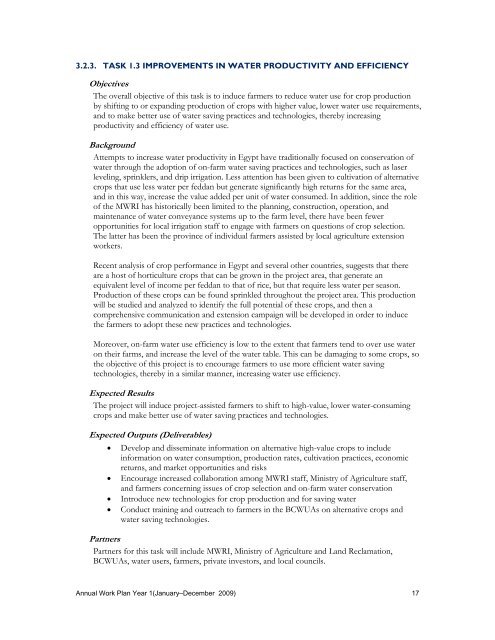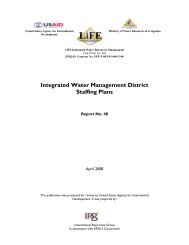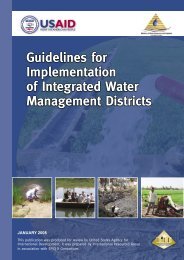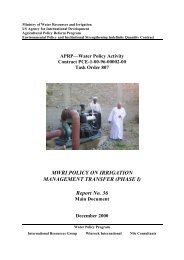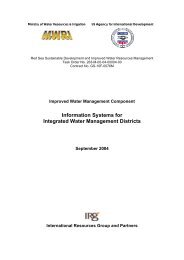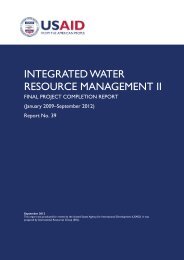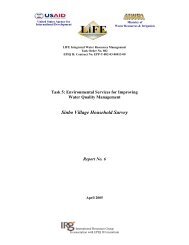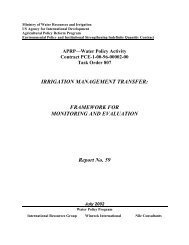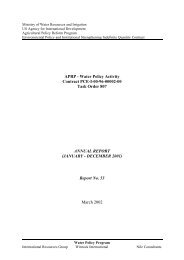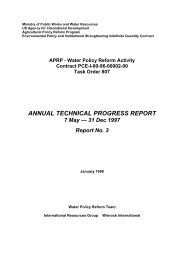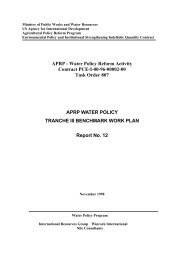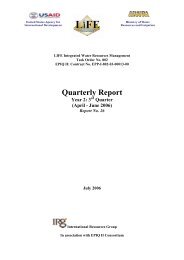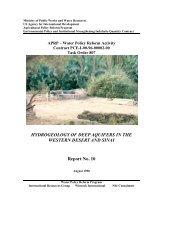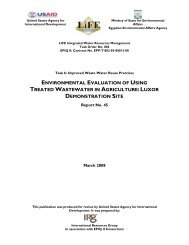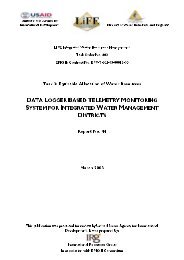ANNUAL WORK PLAN YEAR 1
ANNUAL WORK PLAN YEAR 1
ANNUAL WORK PLAN YEAR 1
You also want an ePaper? Increase the reach of your titles
YUMPU automatically turns print PDFs into web optimized ePapers that Google loves.
3.2.3. TASK 1.3 IMPROVEMENTS IN WATER PRODUCTIVITY AND EFFICIENCY<br />
Objectives<br />
The overall objective of this task is to induce farmers to reduce water use for crop production<br />
by shifting to or expanding production of crops with higher value, lower water use requirements,<br />
and to make better use of water saving practices and technologies, thereby increasing<br />
productivity and efficiency of water use.<br />
Background<br />
Attempts to increase water productivity in Egypt have traditionally focused on conservation of<br />
water through the adoption of on-farm water saving practices and technologies, such as laser<br />
leveling, sprinklers, and drip irrigation. Less attention has been given to cultivation of alternative<br />
crops that use less water per feddan but generate significantly high returns for the same area,<br />
and in this way, increase the value added per unit of water consumed. In addition, since the role<br />
of the MWRI has historically been limited to the planning, construction, operation, and<br />
maintenance of water conveyance systems up to the farm level, there have been fewer<br />
opportunities for local irrigation staff to engage with farmers on questions of crop selection.<br />
The latter has been the province of individual farmers assisted by local agriculture extension<br />
workers.<br />
Recent analysis of crop performance in Egypt and several other countries, suggests that there<br />
are a host of horticulture crops that can be grown in the project area, that generate an<br />
equivalent level of income per feddan to that of rice, but that require less water per season.<br />
Production of these crops can be found sprinkled throughout the project area. This production<br />
will be studied and analyzed to identify the full potential of these crops, and then a<br />
comprehensive communication and extension campaign will be developed in order to induce<br />
the farmers to adopt these new practices and technologies.<br />
Moreover, on-farm water use efficiency is low to the extent that farmers tend to over use water<br />
on their farms, and increase the level of the water table. This can be damaging to some crops, so<br />
the objective of this project is to encourage farmers to use more efficient water saving<br />
technologies, thereby in a similar manner, increasing water use efficiency.<br />
Expected Results<br />
The project will induce project-assisted farmers to shift to high-value, lower water-consuming<br />
crops and make better use of water saving practices and technologies.<br />
Expected Outputs (Deliverables)<br />
• Develop and disseminate information on alternative high-value crops to include<br />
information on water consumption, production rates, cultivation practices, economic<br />
returns, and market opportunities and risks<br />
• Encourage increased collaboration among MWRI staff, Ministry of Agriculture staff,<br />
and farmers concerning issues of crop selection and on-farm water conservation<br />
• Introduce new technologies for crop production and for saving water<br />
• Conduct training and outreach to farmers in the BCWUAs on alternative crops and<br />
water saving technologies.<br />
Partners<br />
Partners for this task will include MWRI, Ministry of Agriculture and Land Reclamation,<br />
BCWUAs, water users, farmers, private investors, and local councils.<br />
Annual Work Plan Year 1(January–December 2009) 17


